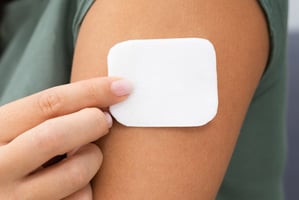During perimenopause, women face an increased risk of new and recurrent depression. Now, a new...
Study Suggests Hormone Therapy May Reduce Risk of Depression During Menopause Transition
 |
“The findings of this study confirm that perimenopausal and early postmenopausal women are at high risk for developing clinically significant depressive symptoms,” wrote Jennifer L. Gordon, Ph.D., of the University of Regina, Canada, and colleagues. “Health care professionals should be alert to the high risk for clinically significant depressive symptoms in this population.”
Gordon and colleagues randomly assigned 172 healthy perimenopausal and early menopausal women aged 45 to 60 years to either continuous transdermal estradiol (0.1 mg/d) plus oral micronized progesterone every two to three months or placebo. Depressive symptoms were assessed at seven visits throughout the year using the Center for Epidemiological Studies-Depression Scale (CES-D).
During the one-year study, women assigned to placebo were more likely than those assigned to the HT regimen to report clinically significant depressive symptoms, defined as a CES-D score of at least 16 (32% versus 17%). Women assigned to placebo were also more likely to have a higher mean CES-D score across the 12-month study compared with those receiving HT. Additional analysis revealed that women in the early stage of perimenopause were most likely to experience mood benefits from the HT regimen for prevention of depression, Gordon and colleagues reported. In fact, the mood-enhancing benefit of HT was not evident among women in the late menopause transition or postmenopausal women studied. The beneficial effect of HT was also more apparent in those with a greater number of stressful life events.
The authors noted that there were three severe adverse events requiring study termination and medical treatment: two cases of major depressive disorder in the placebo group and, in the HT group, one case of an acute deep vein thrombosis—a known risk of HT.
“We commend the authors for investigating the efficacy of a biologically rational strategy to prevent depressive symptoms in women at increased risk owing to reproductive stage using a randomized clinical trial design,” Hadine Joffe, M.D., M.Sc., of Brigham and Women’s Hospital, and Martha Hickey, M.D., of the University of Melbourne, Australia, wrote in a related editorial.
However, Joffe and Hickey cautioned, “Hormone therapy is U.S. Food and Drug Administration–approved for treatment of hot flashes and vaginal dryness, but not for treatment or prevention of mood disturbance. The recommendation by Gordon et al that HT be considered off-label for the prevention of depressive symptoms … is inconsistent with accumulating high-level evidence that HT should not be used for the prevention of chronic disease.”
For related information, see the Psychiatric News article “Discontinuing Hormone Therapy May Increase Risk of Depression in Some Women.”
(Image: iStock/monkeybusinessimages)





